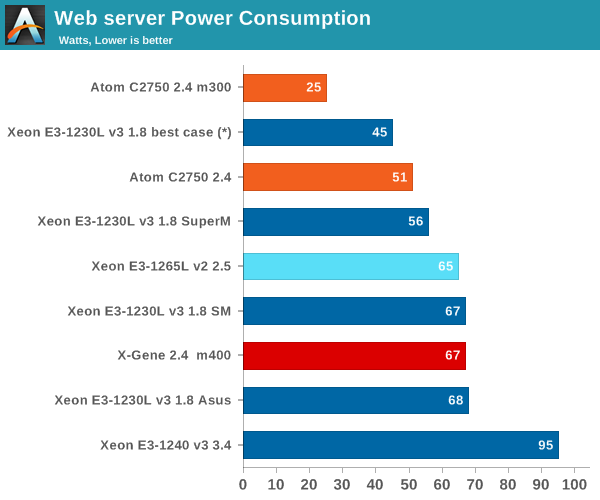X-Gene 1, Atom C2000 and Xeon E3: Exploring the Scale-Out Server World
by Johan De Gelas on March 9, 2015 2:00 PM ESTWeb infrastructure Power consumption
Next we tested the system under load.

(*) measured/calculated to mimic a Xeon-E3 "m300-ish" board.
Notice how much difference there is between a feature rich motherboard and a micro server cartridge. The ASRock board consumes about twice as much as the HP m300 cartridge and the Supermicro node is in between. In both cases the cost of cooling is not included. Of course, we should not compare the ASRock board and the m300 cartridge directly as they target different markets, but it shows that the energy efficiency of a scale-out server infrastructure depends a lot on the server chassis used. HP's Moonshot really nailed it.
Power efficiency is not the forte of the X-Gene at the moment. The Xeon E3-1230L v3 is able to outperform it by a large margin and consumes a lot less power in the process. Even in combination with our most feature-rich boards such as the ASUS P9D-MH, a Xeon E3-1230L v3 does not consume more than an X-Gene with a much more efficient cartridge.










47 Comments
View All Comments
JohanAnandtech - Tuesday, March 10, 2015 - link
Are you sure this is up to date? gcc tells me -march=native is not supported.JohanAnandtech - Tuesday, March 10, 2015 - link
Update. march=native does not work. I have tried -march=armv8-a but does not do much (it is probably the default). O3 makes the biggest difference. Omit it and you get 5.7 GB/s. With -O3, I am at 18 GB/s and more (stream m400)Alone-in-the-net - Tuesday, March 10, 2015 - link
Apologies. For AArch64 the only is "armv8-a", for intel, -march=native sets it to use the one for your CPU.https://gcc.gnu.org/onlinedocs/gcc-4.8.2/gcc/AArch...
https://gcc.gnu.org/onlinedocs/gcc-4.8.2/gcc/i386-...
From version 4.9.x and above of GCC, you can really start to add tuning for the CPU.
https://gcc.gnu.org/onlinedocs/gcc-4.9.2/gcc/AArch...
-mtune=name
Specify the name of the target processor for which GCC should tune the performance of the code. Permissible values for this option are: ‘generic’, ‘cortex-a53’, ‘cortex-a57’.
Additionally, this option can specify that GCC should tune the performance of the code for a big.LITTLE system. The only permissible value is ‘cortex-a57.cortex-a53’.
Where none of -mtune=, -mcpu= or -march= are specified, the code will be tuned to perform well across a range of target processors.
Alone-in-the-net - Tuesday, March 10, 2015 - link
Also support for the XGene1 as a compilation target is only from GCC5.https://gcc.gnu.org/gcc-5/changes.html
Support has been added for the following processors (GCC identifiers in parentheses): ARM Cortex-A72 (cortex-a72) and initial support for its big.LITTLE combination with the ARM Cortex-A53 (cortex-a72.cortex-a53), Cavium ThunderX (thunderx), Applied Micro X-Gene 1 (xgene1). The GCC identifiers can be used as arguments to the -mcpu or -mtune options, for example: -mcpu=xgene1
The_Assimilator - Monday, March 9, 2015 - link
So AMD, how's that bet on ARM you made looking now?extide - Monday, March 9, 2015 - link
Don't count them out yet. I really wish that intel didn't abandon ARM for the Atom, I bet they could come out with a sweet armv8 core if they had to, and on their process it would be sweet.BlueBlazer - Monday, March 9, 2015 - link
That AMD Opteron A1100 looking more like abandonware as more time passes on, and that was like 8 months ago. Until now not a single real world deployment nor was used in any of AMD's own SeaMicro servers. Currently available as development kit with a rather steep price tag.tuxRoller - Monday, March 9, 2015 - link
You REALLY should be using GCC 5. that includes many improvements for the armv8 isa. I'd suggest grabbing a nightly of Fedora 22, but Ubuntu 15.04 may be using gcc5 as well.Wilco1 - Monday, March 9, 2015 - link
Agreed, nobody doing anything on AArch64 should contemplate using GCC4.8. Even 4.9 is way out of date. GCC5.0 with latest GLIBC gives major speedups across the board.JohanAnandtech - Tuesday, March 10, 2015 - link
"Way out of date?" We tried out 4.9.2, which has been released on October 30th 2014. That is about 4 months old. https://www.gnu.org/software/gcc/releases.html. Latest version is 4.8.4, 5.0 has not even been released AFAIK.